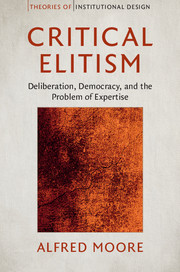Book Review - Critical Elitism: Deliberation, Democracy, and the Problem of Expertise

Critical Elitism: Deliberation, Democracy, and the Problem of Expertise by Alfred Moore. Cambridge: Cambridge University Press 2017. 213 pp, £75 hardcover 9781107194526
Perhaps the most startling development over the past 18 months in democratic politics is the emergence of a ‘post-truth’ narrative. From different corners of the globe, commentators now routinely note that ‘expert opinions’, and the ‘facts’ upon which they rest, have fallen out of favour – not to be trusted due to elite bias and the control of sectoral interests. In its stead, expert judgments are replaced by emotional appeals, populist uprisings, and a ‘fake news’ media. While the causes behind this shift are numerous, it is especially problematic today as many essential state functions have been delegated to depoliticized (non-majoritarian) expert bodies that regulate public life.
What is the relationship between this expertise and democracy? Should we seek to discard so-called experts and accept all viewpoints as equally valid, or should we recognize the epistemic virtues of expertise in complex, democratic systems even at the expense of equality between citizens and experts? These alternate options are both problematic: the former would seem to give up on the moral and empirical truths that many of us hold dear but maintains equality, while the latter accepts the value of expertise but comes with the attendant risk of elite domination.
It is this fundamental tension between democracy and expertise that motivates Alfred Moore’s Critical Elitism: Deliberation, Democracy, and the Problem of Expertise. The book is timely in its orientation, nuanced in its argument, and should be read by anyone interested in how expertise can be rendered democratically legitimate, perhaps helping to move beyond a post-truth political climate.
Throughout the book, Moore makes and substantiates three key claims. First, he accepts that expertise implies a relation of inequality or hierarchy between experts and lay citizens. Second, Moore argues that this relationship can be based on better or worse forms of acceptance. That is, individual acceptance of expertise – and a lack of effort to participate in how that expertise is formed – is warranted if citizens have made an active judgement to remain passive. Finally, expertise can gain democratic authority if those experts discursively justify their position. This last argument was, to my mind, the most novel as it introduces an over-time dimension: that is, (expert) authority is thought to be sustained over long periods of time through continual justification, thus opening space for moments of contestation by citizens in which decisions may be rejected, but the expert’s role seen as legitimate more generally.
What binds these points together is the overarching argument that expertise can be democratically legitimated when it takes place in a wider context that ‘keeps alive’ the possibility of contestation, dissent, and even rejection of expert authority. In bringing this ‘wider context’ to his framework, Moore cements his argument within the ‘deliberative systems’ perspective, fashionable amongst deliberative democrats today. This perspective asks how differentiated actors and institutions can operate in a deliberative system to produce a more democratic whole. On this front, Moore’s argument is novel in many respects: it is one of the first monograph treatments of the deliberative systems concept, certainly the first focused squarely on the role of expertise in the deliberative system, and uniquely offers a temporal dimension to the deliberative systems schematic that is too often missing.
 In doing all of this, the book is divided into an introduction, seven substantive chapters, and a conclusion. The first chapter counterposes Moore’s argument against other recent work on epistemic democracy. He argues that the contestation of elite authority can bring general epistemic advantages by trialing ‘established’ forms of knowledge against different perspectives. The second chapter then introduces the deliberative systems perspective and locates the importance of contestation therein. The third and fourth chapter shows how expert authority can be made democratically legitimate and discusses what good forms of deference to expertise might look like. Chapters five, six, and seven then turn toward an empirical application of these arguments, showing how public contestation of experts can occur, how so-called expert consensus can open space for public judgements, and what role democratic innovations might play in a system that puts a premium on contesting expert judgment.
In doing all of this, the book is divided into an introduction, seven substantive chapters, and a conclusion. The first chapter counterposes Moore’s argument against other recent work on epistemic democracy. He argues that the contestation of elite authority can bring general epistemic advantages by trialing ‘established’ forms of knowledge against different perspectives. The second chapter then introduces the deliberative systems perspective and locates the importance of contestation therein. The third and fourth chapter shows how expert authority can be made democratically legitimate and discusses what good forms of deference to expertise might look like. Chapters five, six, and seven then turn toward an empirical application of these arguments, showing how public contestation of experts can occur, how so-called expert consensus can open space for public judgements, and what role democratic innovations might play in a system that puts a premium on contesting expert judgment.
These arguments are as wide-reaching as they are persuasive. However, throughout the book several potential issues emerge that perhaps requires more sustained treatment or a follow up in future work. I list three issues here.
First, and the most general complaint: throughout the book experts are all tarred with the same brush. In part, this is due to the definition of expertise invoked on p. 6, as “the possession of special skill, experience, information or knowledge rooted in the methods, norms, practices and goals of a specific community and which is recognized as legitimate by the wider society”.[1] Yet it seems to me that this glosses over the difference between various types of experts in the deliberative system. Surely it is relevant whether an expert sits on a central bank or food safety board with the capacity to construct collectively binding decisions, or rather operates as an expert in civil society, perhaps advocating on behalf of weak sectoral interests. This is important because I am not sure that these agents, with very different roles, should be judged by the same set of standards. Why, we might ask, should actors in civil society be democratically legitimated in the same way as those who can write binding laws and regulations? Given the demands of legitimating authority in Moore’s account – deferring to experts by making considered judgements over time – is it appropriate to demand the same standards of legitimacy for different experts? My hunch is no. Recognizing the diverse roles played by different experts would seem an important step to take in a systemic theory.
Second, and perhaps relatedly, I agree with Moore that there are ‘good ways of being passive’. Accepting an expert judgement after due consideration is surely better for both the authority of said expertise and the legitimacy of a system as a whole than deference based on blind belief. While this might be true in theory, I have a hard time separating acceptance from belief in practice. In other words, deference based on acceptance and deference based on belief will look the same without active participation. Of course, those using acceptance to judge experts are more likely to make the most of moments of contestation, thus making this tractable empirically: but much of the time it will not be visible. Judging both the authority of an expert and the quality of the system will therefore be tricky work.
Finally, I have the impression that Moore thinks, both normatively and empirically, that the trialing of expert views against each other, combined with contestatory practices from those implicated in the authority relationship, is inherently good and likely to lead to more stable democratic institutions over time. Even though minorities might not agree with an expert decision, the fact that they can see how the omelet was made – the reasons for expert judgement and the internal disagreement that underwrote group consensus – means that actors (especially minorities) will accept expert decisions. This, to me, is overly optimistic. Precisely because there is reasonable disagreement about many issues of social life, minorities who continuously lose out in expert policy – and find their contestations falling on deaf ears – will likely not see this as fair or worthy of compliance.
At any rate, these issues are far from fatal for the general points made in Critical Elitism. Moore’s argument – indeed the book as a whole – is ambitious. Not only does it tackle a fundamental tension in modern democracy – the necessity of expertise in modern governance paired with its exclusionary tendencies and dangers of domination – but also the book displays mastery of several different literatures. This includes the history of political thought – as arguments from Aristotle, de Tocqueville and Mill are weaved together throughout – as well as studies in social science, science and technology studies, and contemporary democratic theory. The book makes nuanced claims about different types of authority, the promises and pitfalls of consensus in democratic theory and practice, and the role of democratic innovations in sustaining contestation in a deliberative system. I recommend this book highly.
Jonathan W. Kuyper is a postdoctoral fellow at the University of Olso and senior researcher at Stockholm University.
[1] As a minor definitional point, it seems somewhat odd to define expertise as that which is recognized as legitimate by the wider community as, in many instances, the recognition of the legitimacy of expertise is precisely what is questioned by different groups.
Image credit: Policy Exchange via Flickr (CC BY 2.0)


